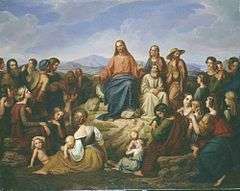Matthew 5:37
Matthew 5:37 is the thirty-seventh verse of the fifth chapter of the Gospel of Matthew in the New Testament and is part of the Sermon on the Mount. This verse is part of either the third or fourth antithesis, the final part of the discussion of oaths.
| Matthew 5:37 | |
|---|---|
← 5:36 5:38 → | |
 "Sermon on the Mount" (De Bergrede) by Carl Joseph Begas, circa 1820, England. | |
| Book | Gospel of Matthew |
| Christian Bible part | New Testament |
Content
In the King James Version of the Bible the text reads:
- But let your communication be, Yea, yea; Nay, nay:
- for whatsoever is more than these cometh of evil.
The World English Bible translates the passage as:
- But let your ‘Yes’ be ‘Yes’ and your ‘No’ be ‘No.’
- Whatever is more than these is of the evil one.
For a collection of other versions see BibleHub Matthew 5:37
Analysis
The exact meaning of this verse is much disputed. One reading is that one should simply answer requests with yes or no, and that anything extra, such as oaths, results in evil. This is very similar to a passage at James 5:12, which quite clearly has this meaning. For the Christian a simple yes or no should be sufficient, no oaths are required as they are to be trusted even without them. This is the most common understanding, and the WEB translation makes this view explicit.[1]
However, the original Greek has the double word format shown in the KJV. The Slavonic Enoch states that a double yes or a double no were themselves forms of oath. By this understanding Jesus is not banning all oaths, but is stating that only this one form of oath is permissible. Theologian R.T. France believed the double words are simply a Semiticism that indicates the word is meant to be used on its own.[2]
There are also multiple understandings of the final phrase. In Matthew 13:19, and in other parts of the New Testament, "Evil One" is used as a name for Satan. Scholar Eduard Schweizer believes that in this instance the gospel of Matthew describes Jesus saying that swearing was evil, not Satanic. Theologically there is little difference.[3]
References
- Albright, W.F. and C.S. Mann. "Matthew." The Anchor Bible Series. New York: Doubleday & Company, 1971.
- France, R.T. The Gospel According to Matthew: an Introduction and Commentary. Leicester: Inter-Varsity, 1985.
- Schweizer, Eduard. The Good News According to Matthew. Atlanta: John Knox Press, 1975
| Preceded by Matthew 5:36 |
Gospel of Matthew Chapter 5 |
Succeeded by Matthew 5:38 |